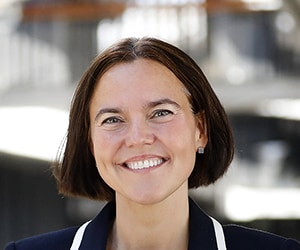Luisa Gomez Bravo, global head of Corporate and Investment Banking, talks about what sets BBVA apart from competitors and how it keeps innovating for its clients.

Global Finance: How does BBVA differentiate itself from its rivals?
Luisa Gomez Bravo: We are in a continuous innovation mode to enhance the service we give, not only designing new products to solve the clients’ needs, but also developing new technological solutions. This focus has allowed us to differentiate ourselves from our peers in three areas: 1) playing a leading role in sustainable finance, thanks to BBVA’s new solutions across products, including the world’s first sustainable deal in transactional business, and leading green and sustainable bonds and loans in all our geographies; 2) taking a lead in using distributed ledger technology and blockchain in corporate solutions; pioneering in synthetic securitization, syndicated lending, and warrants issuance; and closing the first DLT loan with a public administration to finance sustainable purposes; and 3) offering innovative products to our clients, such as digital loans, flexible-term loans and multicurrency facilities.
However, to be able to stay in the lead, we have to stay alert and constantly improve our service offerings.
GF: What is your outlook for corporate and investment banking in 2019 and 2020 in EMEA and Latin America?
Gomez Bravo: Geopolitical developments will continue to drive the agenda. This, together with stagnant growth and low inflation, will continue to require new monetary as well as fiscal stimulus. The challenge is to find growth opportunities in the current rates scenario with flat/inverted yield curves.
In Europe, the Middle East and Africa, the geopolitical agenda is driven by Brexit, Italy and the growth slowdown in Central Europe, leading to a very uncertain 2020 outlook. We will see selective inorganic growth with M&A activity in certain sectors, while other companies will focus on optimizing their balance sheets through share buybacks and debt management. In Turkey, the volatility introduced by the currency crisis of last year seems to be improving, with promising signs in interest rates and exchange rates. In 2020 we expect that activity will continue on its path toward normal levels. In Asia, the consequences of the trade war between China and the US are depressing the Chinese offshore market, driving borrowers toward the onshore marketplace.
In Latin America, 2019 has been a complex year with a lot of market turmoil coming from different economic and political events internationally (such as the US-China trade war), regionally (the trade agreement between Mexico, the US and Canada) and locally (political elections, monetary policy adjustments), which have affected activity in the region. Although in some countries the activity has recovered to a certain extent, it continues to be moderate and below the average we have seen in previous years.
Political developments will be the main factor for the outlook in 2019 and 2020. Argentina and the evolution of the electoral agenda, and policy implementations in Brazil and Mexico by the recently elected leaders, will be driving the headlines and market sentiment in the coming months. Stability in the political scene will be key to achieving the growth potential of the region. As investors seek yield and markets innovate in Latam, we could see very good opportunities for our corporate clients there—provided uncertainties dissipate.
GF: What keeps you up at night?
Gomez Bravo: The first is how we can continue to be meaningful to our clients and generate value to our shareholders in very competitive and increasingly complex markets. I feel that there are many opportunities in this regard, but I am now focused on one: How can we help our clients transition to a more sustainable future? If you add up all the employees, suppliers and clients of our corporate clients, the reach into society is very significant.
Our bigger corporate customers are large employers and have, like us, millions of customers, so I truly believe in the exponential impact that working together could have in changing the world for the better. It is very aspirational, for sure, but I feel the time is now to make a call to action.
My second area of attention is our teams. Our business relies on having the best talent, so how do we keep our people engaged and motivated in the current challenging environment? How do we ensure the highest standards in conduct, live our BBVA values through example, and promote diversity and inclusion? How do we reskill ourselves to prepare for even more-intense digital disruption? These are the questions on my mind, to name a few.



